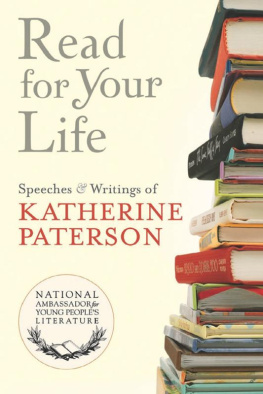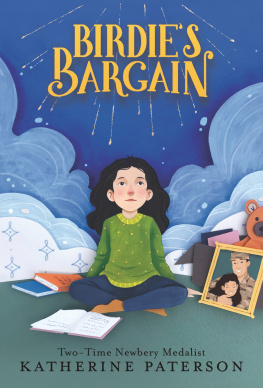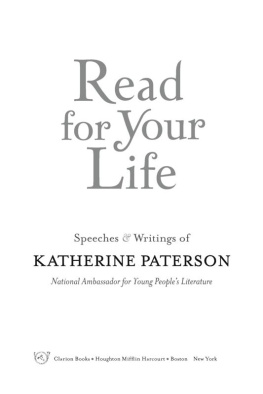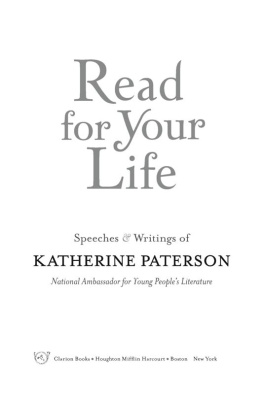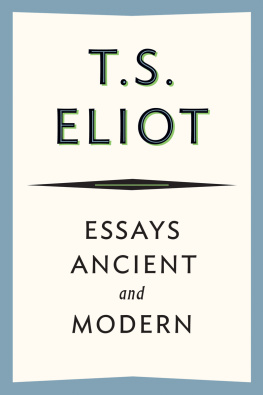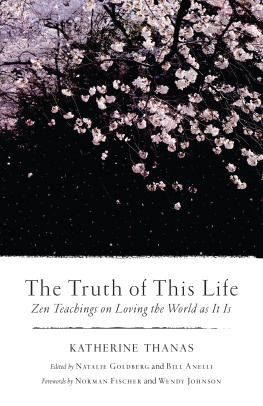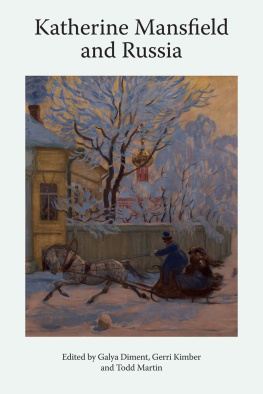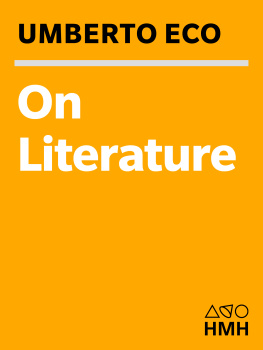Katherine Paterson - Read for Your Life #19
Here you can read online Katherine Paterson - Read for Your Life #19 full text of the book (entire story) in english for free. Download pdf and epub, get meaning, cover and reviews about this ebook. year: 2011, publisher: HarperCollins, genre: Children. Description of the work, (preface) as well as reviews are available. Best literature library LitArk.com created for fans of good reading and offers a wide selection of genres:
Romance novel
Science fiction
Adventure
Detective
Science
History
Home and family
Prose
Art
Politics
Computer
Non-fiction
Religion
Business
Children
Humor
Choose a favorite category and find really read worthwhile books. Enjoy immersion in the world of imagination, feel the emotions of the characters or learn something new for yourself, make an fascinating discovery.
- Book:Read for Your Life #19
- Author:
- Publisher:HarperCollins
- Genre:
- Year:2011
- Rating:4 / 5
- Favourites:Add to favourites
- Your mark:
- 80
- 1
- 2
- 3
- 4
- 5
Read for Your Life #19: summary, description and annotation
We offer to read an annotation, description, summary or preface (depends on what the author of the book "Read for Your Life #19" wrote himself). If you haven't found the necessary information about the book — write in the comments, we will try to find it.
Houghton Mifflin Harcourt is publishing a monthly series of e-only essays to correspond with Katherine Patersons two-year term as the National Ambassador for Young Peoples Literature. The subjects of the essays include: writing and literature for young people, the wonder and imagination found within great books, common questions novice writers ask, and Katherines own personal experiences throughout her historic career.
Read for Your Life #19 — read online for free the complete book (whole text) full work
Below is the text of the book, divided by pages. System saving the place of the last page read, allows you to conveniently read the book "Read for Your Life #19" online for free, without having to search again every time where you left off. Put a bookmark, and you can go to the page where you finished reading at any time.
Font size:
Interval:
Bookmark:
V ELMA V ARNER L ECTURE
December 8, 1979
W HEN I told a friend of mine that I was going to tackle the subject of "words," she asked me quite naturally what I was going to say about them. "Well," I said, "I think I have something valid to sayI just haven't figured out what it is yet." Which, of course, is one of the problems with wordsthere they all are, humanity's greatest natural resource, but most of us have trouble figuring out how to put them together in a valuable way.
So we blame it on the words. Words are cheap, we say. One picture is worth a thousand words. Silence is golden.
But words aren't cheap. They are very precious. They are like water, which gives life and growth and refreshment, but because it has always been abundant, we treat it cheaply. We waste it and pollute it and doctor it. Then, when we take a drink from a city faucet, we wrinkle our nose and say: "This is terrible water." And we blame the water because we have misused it.
Words! Words! Words! [cries Eliza Doolittle]
I'm so sick of words!
I get words all day through;
First from him, now from you!
Is that all you blighters can do?
Now, there is probably not one of us who has not had the impulse in the middle of an interminable committee meeting to leap to his feet like Julie Andrews and sing out this protest, but as one of the blighters with a vested interest in the commodity, I feel the need from time to time to justify myself, especially to myself. I read the newspaper. I watch the eleven o'clock news. I know as well as anyone else that the International Year of the Child came to an end with countless children starving to death in Cambodia. Children in Northern Ireland are still playing warand not just pretend. My daily newspaper carries accounts of battered, even maimed, children in my own city. And this fall a six-year-old and a nine-year-old made a serious attempt to hold up a bank. The clerks thought it was cute.
And what am I doing while the world is falling apart? I am sitting in my little study in front of my typewriter, trying to find words and put them together. Sometimes I see it as an evasion of responsibility, sometimes escape, and always as selfishness, since I particularly love what I'm doing. I'm uncomfortably reminded of the story of the old Quaker who, after his first cup of coffee, said, "Anything that tastes this good has got to be a sin."
But granted all this, still I believe that words, too, are necessities and to give the children of the world the words they need is, in a real sense, to give them life and growth and refreshment.
If sometimes today I feel myself drowning in verbiage, I can remember clearly how it feels not to have any words. In those months after I went to Japan in 1957, I would often find myself being taken somewhere by Japanese friends, not knowing where I was going or whom I was going to see. When I got to wherever I had been taken, I would find myself surrounded by people who were talking and laughing away, but because I did not know their words, I was totally shut out. As I began to learn a few words, people would try with infinite, exaggerated patience to talk with me. And because my speech was so halting and miserable, they would try to help me, try to put words into my mouth, try to guess what on earth it was I was trying to convey. When I was finally able to get out a sentence near enough to Japanese so that my listeners could grasp what I was driving at, they felt sure I'd appreciate knowing how I should have expressed that particular thought, and they would gently, firmly, and ever so politely, take my pitiful little sentence apart and correct it for me.
I'm sorry to report that I was not grateful. I wanted to yell, cry, throw a tantrum. I am not a fool! I wanted to scream. If only you could know me in English, you would see at once what a clever, delightful person I am. But, of course, I didn't say it. I couldn't say it. I didn't have the minimum daily requirement in either vocabulary or syntax. The first time I saw the play The Miracle Worker, I knew what had been happening to me in those days. It was the rage of those starving for words.
In 1961, after four years in Japan, I boarded a jet in Tokyo and landed about twenty hours later in Baltimore. I was met by my parents and one of my sisters and taken home to Virginia. Every night for many weeks I would get out of the soft bed, which was killing my back, and lie sleepless on the floor. I was utterly miserable. "These people," I would say to myself, meaning my own family, "these people don't even know me." The reason I thought my family didn't know me was that they didn't know me in Japanese.
You see, in those four years, I had become a different person. I had not only learned new ways to express myself, but had new thoughts to express. I had come by painful experience to a conclusion that linguists now advance: language is not simply the instrument by which we communicate thought. The language we speak will shape the thoughts and feelings themselves.
Because I remembered so well what it was like not to have words, it was easy for me to imagine, when I at last became a mother, what my children were going through when they were first learning to speak. In my great and just possibly superfluous concern, I determined to help them all I could. I spoke to them from the first in complete English sentences, just as though they could take in every word I was saying. I read to them poems and wonderful books, far before an educator, indeed before any sensible person would think they could be ready to understand the words. But in the midst of this richness, when one of them would stand before me, the little cords straining in his neck, as he sought to express the still inexpressible, I would wait with totally uncharacteristic patience, reasoning that if my children were to learn to speak freely and comfortably to me, I must be willing to listen. Neither would I correct their mistakes. It is rude, I thought, to correct the grammar of someone who is trying his best to tell you something, no matter how tall the person might happen to be. And if it was rude for me, it was certain to be frustrating and discouraging to the speaker. They would learn quite soon enough, I reasoned, the difference between the singular and plural form of the verb. All they had to do was listen. If not to me, to their father.
Well, the other day, the turkeys flew home to roost. One of them came home from school totally scandalized by a bit of information from his English teacher. "Do you know what she said?" he asked. And while I waited for the revelation of his teacher's radical political or moral philosophy, he continued in the same shocked tone: "She said I couldn't say, 'Who are you waiting for?'"
"She did?" I asked nervously.
"She said" he could hardly believe it still "she said I had to say, 'For whoooooom are you waiting?'"
"I'm afraid she's right."
"Whaaaaat? You think I'm going around saying 'For whoooom are you waiting?' Everybody would think I'd gone nuts."
The grammar lesson was obviously overdue. "No," I agreed. "If you went around saying 'For whoooooom are you waiting?,' or even if I had a kid in a book who said, 'For whom are you waiting?,' everyone would think we had taken leave of our senses, but, actually, your teacher is right. The correct, formal English is 'For whom are you waiting?'"
He gave me a look of utter disgust and muttered "For whoom" several times under his breath, making it sound for all the world like an obscenity. Finally he said, "Why do we have to have proper grammar, anyway? Why can't we just go around grunting like the cavemen?"
Now, for all my failures as a teacher of English, I want to assure you that my son is not going to give up language and return to grunting. This is the child of ours so in need of language that, perceiving great lacks in English, he invents language and vocabulary to fill the gaps. There is, he perceived, no adequate mild expletive in English. The Japanese have a very nice one
Font size:
Interval:
Bookmark:
Similar books «Read for Your Life #19»
Look at similar books to Read for Your Life #19. We have selected literature similar in name and meaning in the hope of providing readers with more options to find new, interesting, not yet read works.
Discussion, reviews of the book Read for Your Life #19 and just readers' own opinions. Leave your comments, write what you think about the work, its meaning or the main characters. Specify what exactly you liked and what you didn't like, and why you think so.

